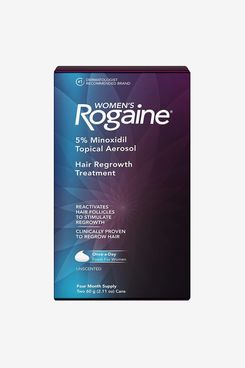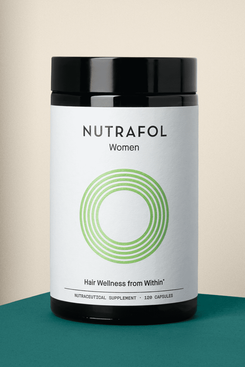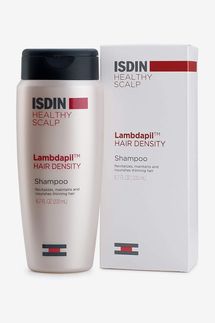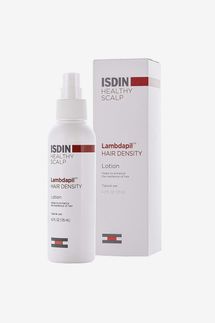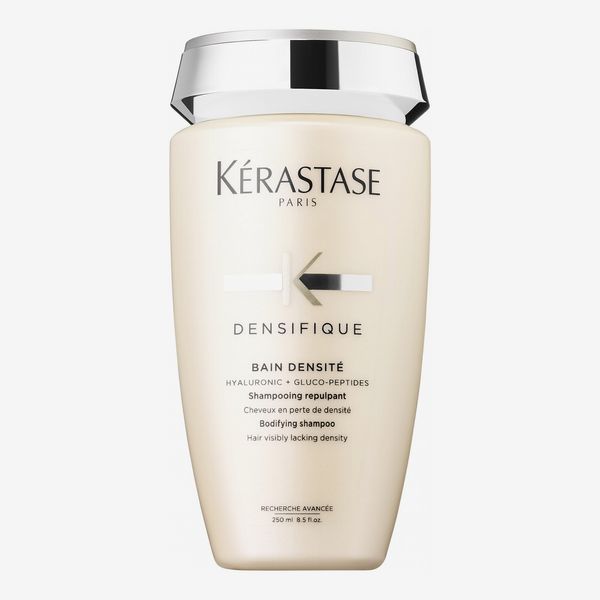
Earlier this month, when we spoke to dermatologists about the best ways to treat common issues at home, they reported an uptick among their patients in the usual stress-triggered suspects like acne, eczema, and rosacea. But they also mentioned one condition we didn’t expect: stress-related hair loss. Technically known as telogen effluvium, this is a type of temporary hair shedding brought on by major physiological changes like childbirth, undergoing surgery, significant weight loss and — something many of us are experiencing during this pandemic — emotional stress.
Amy McMichael, chair of the dermatology department at Wake Forest Baptist Health Medical Center, explains that hair typically goes through three phases: growth, transition from growth to shedding, and shedding. While 8–10% of your hair is normally in the shedding phase, telogen effluvium forces upwards of 50% of hair into that phase, causing it to fall out. “The affected hair is pushed to a quiescent, nongrowth stage so that the body can apply its energies elsewhere to preserve itself in response to the stress,” says dermatologist Christine M. Shaver of Bernstein Medical. This isn’t a common response for most people, however. As McMichael says, “stress in and of itself doesn’t cause hair loss. Your body has to already be predisposed to it.” So while lots of us may be feeling frazzled, not all of us are at risk for telogen effluvium.
While the condition is certainly distressing, it’s comforting to know that, unlike male-pattern baldness, it’s only temporary. The hair will grow back with time, and there are things you can do to speed up the process. “I typically encourage patients to treat this from the outside in and from the inside out,” says dermatologist Joshua Zeichner, director of cosmetic and clinical research at Mount Sinai Hospital. He says a combination of stress-reduction techniques (think meditation, relaxation, exercise, or whatever else helps calm your mind) and products, as described below, can help.
Four of the five dermatologists we spoke with recommend minoxidil, the active ingredient in Rogaine, for encouraging hair growth. McMichael typically puts her patients on a six-month course of Rogaine, which she says works by prolonging the growth phase. “It enhances hair follicle functioning,” says Zeichner, “but you need to stick with it. It takes several weeks or even months of continuous use to exert its effect.” According to dermatologist Erum Ilyas, “it can take upwards of a year to really appreciate the hair regrowth. This is simply because the new hair growing in is like peach fuzz or baby hair — it is fine, wispy, and unmanageable As it grows longer, it will get thicker and coarser and start to look and feel the way it used to.”
Supplements can boost growth, but the dermatologists we spoke with say it’s important to choose the right one and be wary of marketing claims. Both Ilyas and McMichael point out that biotin, a B vitamin typically advertised for hair and nail growth, can cause inaccurate results in blood tests for hormonal or cardiac conditions, occasionally with serious consequences, as described in this FDA warning. As an alternative, Zeichner and McMichael recommend Nutrafol, a blend of micronutrients including ashwagandha and saw palmetto that are, according to Zeichner, clinically shown to increase hair density. “It works as an anti-inflammatory, and it helps provide the building blocks that the hairs need for optimal functioning,” he says. You’ll still want to tell your physician that you’re taking Nutrafol, as it does contain some biotin, which speaks more to the vitamin’s popularity than its efficacy. “People think biotin works, so they want to put it in there, at least at some level, so people will buy it,” McMichael says.
Melissa Kanchanapoomi Levin, a dermatologist and founder of Entière Dermatology, has heard from at least five patients experiencing hair loss in recent weeks. She is a fan of the Spanish brand Isdin’s hair density line for promoting fuller, thicker hair. She says the shampoo “strengthens the existing hair that you have,” while the lotion “has ingredients that are similar to minoxidil, which increases blood flow to the scalp.”
As your hair grows back, McMichael says to treat it gently, avoiding further damage that can come from coloring or excessive heat styling. Unless you have dry or tightly coiled hair, she suggests adding a thickening shampoo to your routine, which “swells the hair shaft and makes it look a little fuller.” While she doesn’t recommend any specific brand (she says any shampoos advertised as “thickening” or “for fine hair” will have this effect), this Kérastase shampoo is a stylist pick for both fine and thinning hair. According to Fred Connors, owner and creative director of FRED Salon, it’s a favorite because “it contains hyaluronic acid to plump hair up and ceramides to strengthen.”
The Strategist is designed to surface the most useful, expert recommendations for things to buy across the vast e-commerce landscape. Some of our latest conquests include the best acne treatments, rolling luggage, pillows for side sleepers, natural anxiety remedies, and bath towels. We update links when possible, but note that deals can expire and all prices are subject to change.
